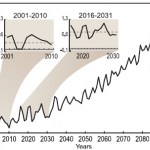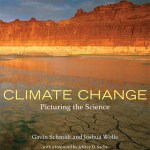climate change
I feel I'd be neglecting my duties to those few readers of mine who don't read enough other sources if I didn't at least mention Andy Revkin's piece in today's New York Times. An anonymous lawyer slipped him, in what would have once arrived in a brown paper envelope, a document unearthed in a California lawsuit. It doesn't tell us anything we didn't already know, generally speaking, but it's always good to be able to point to specific evidence when you summarily dismiss an entire industry as untrustworthy.
Here's what a coalition of coal, oil and auto industries said their scientific advisers…
... you could be in for a surprise. If, that is, you're not up on the latest climate research. Figuring out what role the forests will play in the Earth's climate regulating mechanisms have long proved more than a little tricky. And it just keeps getting more complicated.
Back at the turn of the century, for example, it was widely assumed that heavily forested countries would be in an enviable position when it comes to calculating net carbon emissions. Canada went to Kyoto negotiations in 2001 arguing that it should get credit for maintaining its vast boreal forests, because "everyone knows…
It's Earth Day, so in the spirit of celebration, instead of dwelling on the bad news (like the report that 9 out of 10 attendees at the recent Copenhagen scientific conference on climate change don't expect us to be able to avoid increasing the planet's average temperature by a "dangerous" 2°C -- I said I wouldn't dwell, but I reserve the right to mention), let's consider things from an optimist's point of view.
Which optimist should we choose? How about New York Times columnist John Tierney? Not because he's a particularly well-regarded climatologist. He's not even a scientist at all. Like…
I'm sure most of us remember how incoherent Sarah Palin was about climate change (well, okay, about most things), but John Boehner seems to have his sights set on out doing the master!
In an interview with George Stephanopoulos (partial transcript here) his mangling of anything even remotely resembling an intelligent thought is really quite astounding!
His answer to climate change incredibly includes:
we need American-made oil and gas
Because foreign CO2 has such a higher greenhouse potential than good ol' American CO2.
Boehner offers this boner about the recent EPA ruling:
the idea that…
The latest report from the Pew Forum provides yet more evidence that the culture wars are more than an amusing abstraction for social scientists. Here's the question, asked of 1502 Americans:
From what you've read and heard, is there solid evidence that the average temperature on Earth has been getting warmer over the past few decades, or not? [If "yes," ask]: Do you believe that the earth is getting warmer... 1 - Mostly because of human activity, such as burning fossil fuels, OR 2 - Mostly because of natural patterns in the earth's environment? [options rotated]
And here are the results,…
Fred Pearce, whose byline is most commonly seen in New Scientist over feature stories about climate change, has done a little bit of thinking about whether we should be worried about the virtual certainty that the world's population will hit 9 billion before it starts to fall in the second half of this century. His verdict? While still a serious problem when it comes to the evils of poverty, overpopulation will have little bearing on our efforts to deal with global warming.
The title of his piece in Yale's e360 pretty much says it all: "Consumption Dwarfs Population
As Main Environmental…
A new paper to be published next week in Geophysical Research Letters (which really needs a better name) lays out what kind of effort would be required to reduce the impacts of climate change by half. Actually, what it does is conclude that if we reign in our fossil-fuel emissions by 70%, temperature rise and a few other consequences will be roughly half of what they'd be in the absence of any mitigating effort. But since both targets are arbitrary, it doesn't really matter which way you approach the subject.
Either way, the news ain't good.
In "How much climate change can be avoided by…
And now, in another edition of "I was going to ignore this, but," I draw your attention to the latest career move of one Marc Morano and his unwavering campaign to undermine public support for any and all policies that might give us a chance to forestall catastrophic climate change
I was hoping that Morano, the former pseudo-journalist who first rose to prominence by serving as chief propagandist for the Swift Boat veterans who helped defeat John Kerry's presidential bid in 2004, would just go away after leaving the employ of Republican Sen. James "global warming is a hoax" Inhofe a few weeks…
Back when I was an editor of a small-town community weekly, I had a bumper sticker affixed to one of my office walls with a simple message: "ASSUME NOTHING." One of my predecessors had left it behind. I really should get a new one because, like even the best journalists and bloggers, I need to be reminded of that cardinal rule, and regularly.
Back in January, I posted a rebuttal to Michican columnist John Tomlinson's hopelessly misinformed attempt to debunk anthropogenic climate change. In my post, I repeated an error Tomlinson made by referring to the "Arctic Climate Research Center" at the…
Very few relationships in this world are monotonic. Not the price of stocks, not the traffic on this blog, and not global climate trends. Maybe if more people understood this, we'd have less nonsense about climate change clogging the media.
By monotonic, I mean, if you plot a trend on a standard x-y graph, monotonic lines will always go in the same direction, whether it's up, down or flat, no matter what the scale. The fact that most functions aren't monotonic should be obvious to anyone who thinks about it for a while. The real world has a habit of being a little wonky. Even those things…
This Tuesday, April 7, the Koshland Science museum in DC is hosting a book talk:
Join NASA scientist Gavin Schmidt and accomplished photographer Joshua Wolfe as they demonstrate how photographs can illustrate the effects of global warming more poignantly than any temperature graph or chart. The two will show photos and satellite images of retreating glaciers, sinking villages in Alaska's tundra, and drying lakes from their new book, Climate Change: Picturing the Science. They will also discuss how scientists gather climate data and come up with cutting-edge research findings.
RSVPs are…
In an article in The New York Times Magazine Sunday, Freeman Dyson—best known for his work in theoretical physics—discussed his belief that climate change is an issue that should be approached with skepticism. ScienceBloggers responded with thoughtful consideration. Dyson stated in the Times piece that while prevailing dogmas about climate change may be right, they deserve to be challenged. "That they do," conceded ScienceBlogger James Hrynyshyn from The Island of Doubt. "My only quibble is they are best challenged by those with a good grasp of the latest findings."
I was wrong. Indeed, it would seem I've been laboring under a misapprehension for the last couple of decades. Anthropogenic global warming is, after all, a fraud, a colossal scheme designed to subvert the very foundations of modern civilization in a favor of a socialist world government that controls every aspect of our lives down to the air fresheners in our bathrooms.
How have I come to this conclusion, one that I will admit is in direction contradiction to just about everything I have written on the subject since the late 1980s? It wasn't any one piece of evidence. Rather, it's more like I…
A little over a week ago the Environmental Protection Agency sent the White House its finding that global warming endangers public health and welfare. This doesn't sound like news, and except for a minority of scientists out there it is very, very old news. But in the context of a 2007 Supreme Court ruling it is indeed big news:
The proposal -- which comes in response to a 2007 Supreme Court decision ordering EPA to consider whether carbon dioxide and other greenhouse gases should be regulated under the Clean Air Act -- could lay the groundwork for nationwide measures to limit such emissions…
I may be very late to the party, but I would still like to refer readers to Chris Mooney's Op-Ed response to the recent George Will fiasco.
Congratulations, Chris, it is very well presented and important material. I can't however share your warm fuzzies for the WaPo's change of heart, because, well somehow presenting two sides to a debate, you know, bat-shit crazy versus intelligent reality, still falls a little short for me!
Sipping from the internet firehose...
This weekly posting is brought to you courtesy of H.E.Taylor. Happy reading, I hope you enjoy this week's Global Warming news roundup
skip to bottom Another week of Climate Disruption News Information overload is pattern recognition March 22, 2009 Top Stories: Earth Hour, Maldives, US Polls, Copenhagen Melting Arctic, Polar Bear, Arctic Geopolitics, Grumbine, Late Comments Food Crisis, Food Production Hurricanes, GHGs, Carbon Cycle, Temperatures, Sea Levels, Satellites Impacts, Forests, Wacky Weather, Wildfires, Floods & Droughts, World…
tags: The State of the Birds 2009, ornithology, birds, endangered species, conservation, global warming, climate change, environment, invasive species, habitat loss
Streaming video [6:31]
According to the most comprehensive report ever published in the USA, nearly one third of America's 800 native bird species are endangered, threatened, or in significant decline, thanks to habitat loss, pollution, climate change, competition from invasive species and other threats.
The shocking report, published by the US Fish and Wildlife Service, reveals that of the more than 800 bird species that…
James Hrynyshyn at Island of Doubt yesterday put up a really interesting examination of the Copenhagen Conference's efforts to deal with just what is the "safety limit" for global warming. I won't add much accept to lament the fact that "as much as possible as soon as possible" is too vague for public policy goals.
Because really, that is the only correct answer to the question politicians want scientists to answer: how much do we need to reduce CO2 emissions?
Have a read.
That is, as the Dane said, the question.
The short answer is "nobody knows," of course. The ice core records suggest that we're adding CO2 to the atmosphere faster than the planet has ever seen before. That doesn't necessarily mean that the consequences of doing so ;;;; planetary warming and extreme drought in dry areas, for example ;;;; will be felt soon, or at all. But in the past, such consequences sooner or later come about. And it would be foolish to operate on the assumption that the Earth has some of kind of hitherto undiscovered compensatory mechanism that spares us from them.
Which…
A story on the fate of Greenland's ice sheet published last week in The Guardian attracted the expected level of interest from those who uncritically repeat any scientific tidbit that reminds us we still don't know everything we need to know about climate change. This was because the story, as written, implied the ice sheet isn't as sensitive to global warming as is popularly thought.
Something about the story didn't seem exactly right to me, though. For one thing, it was based not on a peer-reviewed paper but a presentation to the recent scientific meeting on climate change in Copenhagen.…

